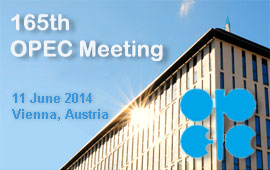The Organization of the Petroleum Exporting Countries (OPEC) is holding its first 2014 Conference in Vienna on June 11. Like the previous two years, OPEC is unlikely to face any serious challenges with regard to the level of oil production.
In their meetings since 2012, OPEC ministers have maintained the body’s production ceiling at 30 mb/d. It implies that OPEC has been happy with production level and prices over the past two years.
A review of developments shows that the average oil price has always stood above 100 dollars since 2012. Such a price has been satisfactory for OPEC member states in terms of revenues and has provided them enough capital to finance development of their oil fields.
Oil production in some OPEC countries stands at a very low level, but the production costs do not set the only yardstick for viewing 100 dollars as fair price.
OPEC supplies only 30 percent of the world oil with non-OPEC accounting for the rest, but production costs are high in non-OPEC countries. It is noteworthy that shale oil and gas extraction in the US would not be cost-effective should prices remain below 100 dollars a barrel.
Oil prices have so far satisfied both consumers and producers and such a relative satisfaction facilitates decision-making in the OPEC.
Although OPEC has maintained production ceiling at 30 mb/d and has shown satisfaction with the prices, some OPEC states have experienced severe fluctuations in oil production and exports, which may lead to price volatility, market turbulence and jeopardizing energy security.
Arab Spring revolts have hindered oil production and exports by OPEC and non-OPEC countries in the Middle East, including Libya, Egypt and Syria. In some cases, oil prices surged significantly.
Egypt is not a leading oil exporter, however political unrest in this North African country raised concerns about energy security supply as the Suez Canal is a major oil transit route. Syria also faced disruption in its oil production due to war. Syria is not a big oil exporter either.
But Libya, an OPEC member state, also experienced disruption in oil production and exports after the country plunged into political instability. Libya was more influential than Syria and Egypt on oil markets.
OPEC is now preparing to hold its 165th Conference, while unrest goes on in Libya, Egypt and Syria, albeit their impact has been blunted. However, Libya is facing challenges in bringing back its oil production to 1.6 mb/d when Muammar Gaddafi was still in power.
For its part, Iran has been under sanctions over the past two years; nevertheless the conditions are changing thanks to a new administration and the return of Bijan Namdar Zangeneh to the Petroleum Ministry.
OPEC has maintained its production ceiling, while Iran has had to reduce its production and exports due to the sanctions.
Since President Hassan Rouhani took office last August, Iran has made efforts to raise its oil exports in order to win back its status in the OPEC. Iran’s nuclear deal with the six world powers has been of help.
After two consecutive years of reduction, Iran’s oil exports are expected to grow this year.
Zangeneh told the last December OPEC Conference that Iran’s priority in the world market would be to enhance its oil production and exports. Zangeneh made it clear that the post of OPEC secretary general and oil price come second in priority.
The 164th OPEC Conference was overshadowed by the news regarding Zangeneh’s meetings with the chief executives of oil giants willing to resume work in Iran.
An issue which has remained unresolved in the OPEC is its secretary general.
Abdalla Salem El-Badri of Libya continues to serve as OPEC secretary general up to the end of 2014. He has been in post since 2007. Iran, Iraq and Saudi Arabia have nominated candidates for the top post, but lack of consensus has not allowed the election of a successor to El-Badri.
The election of a new secretary general for OPEC may be influenced by Saudi Foreign Minister Prince Saud al-Faisal’s invitation to Iranian Foreign Minister Mohammad-Javad Zarif for an official visit to the kingdom.
Improve political ties between Tehran and Riyadh would facilitate election of a new secretary general for OPEC. We should keep in mind that Iran’s improved relations with member states of the Gas Exporting Countries Forum (GECF) facilitated the election of a secretary general for this forum. In its last November Ministerial Meeting in Tehran, GECF elected Iran’s Mohammad-Hossein Adeli as secretary general.
Turning to OPEC production, an analysis of OPEC policies in the past two years indicates that the oil body would keep its production ceiling at 30 mb/d.
OPEC’s satisfaction with the oil market and its share of the world markets have made officials from the 12 member countries to express less about the oil market or demand changes in the OPEC policies.
Views heard from time to time from OPEC officials about the oil market are indication of their happiness with the status quo.
Addressing the 14th IEF Ministerial Meeting, Plenary Session One in Moscow on May 15, El-Badri said that the oil market is quite stable and that the conditions will not change throughout 2014.
He said the world market is facing sustainable growing demand and the market is well-supplied to meet the soaring demand.
El-Badri also gave a positive assessment of the oil prices, saying they are acceptable for both producers and consumers.
Based on El-Badri’s remarks, one can expect that OPEC would again set its production ceiling at 30 mb/d as a sign of its happiness with the 100 dollars a barrel.
By Heshmatollah Razavi


Your Comment